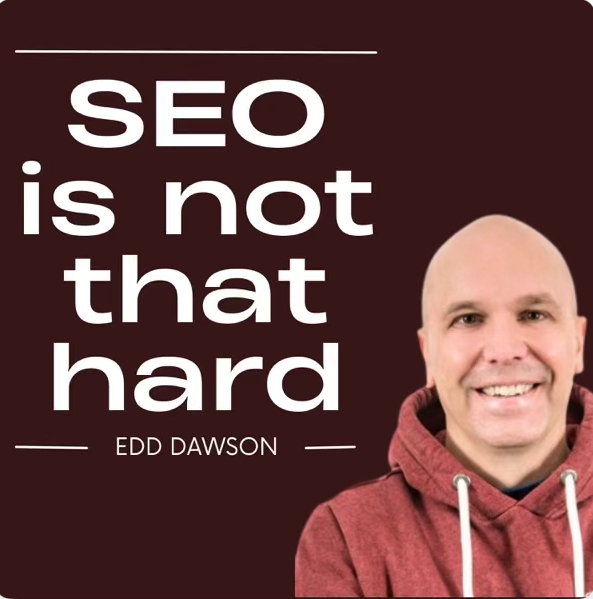SEO in the Age of AI: The Fundamentals That Still Move the Needle
(Key Insights by Edd Dawson from his podcast ‘SEO is Not that Hard’)
Picture the search landscape today, buzzing with AI search answers and smart language models like ChatGPT and Claude everywhere you look.
Is old-school SEO obsolete? Edd Dawson, a 20-year veteran affiliate marketer, entrepreneur, and the mastermind behind Keywords People Use, says no.
TL;DR: What Does it SEO in the Age of AI Mean?
SEO in the AI era still comes down to serving people first. Use AI for research, outlines, and drafts, but anchor pages in real experience, original insights, and clear answers. Target intent, structure for skimmers, and fact-check everything. Google rewards helpful, trustworthy content, not AI for AI’s sake. Blend AI speed with human expertise, and keep updating as search evolves.
SEO’s Classic Rules Meet the New AI Age
For affiliate bloggers who work hard on content writing, his podcast “SEO is Not That Hard” unpacks why classic SEO still matters, even in an AI world.
This episode distills the knowledge you need to stay visible, prove authority, and keep earning traffic as search matures.
You’ll discover which fundamentals last, what’s different, and why the essentials are even more crucial as AI reshapes how people find and trust information.
SEO and AI Search: What’s Changing, What Isn’t
In the last year, large language models like ChatGPT and Claude started changing how people find information. Google now experiments with AI-generated overviews right in search results.
Many wonder if this trend signals the end of organic SEO as we know it. Edd’s view, shaped by real results on affiliate and e-commerce projects, brings perspective.
Sites winning today:
- E-commerce businesses that actually sell and fulfill products
- Affiliate and publisher sites with unique, real-time, or hard-to-find data (for example, broadband availability databases that update faster than an AI can)
Sites struggling:
- Blogs and informational sites filled with basic, easy-to-scrape answers and reliant on display ads
Even so, most regular users still search the “old way.” AI overviews and chatbots haven’t taken over daily habits for the broader population yet.
The fundamentals of search optimization still work, but what matters is how you apply them in the AI age.
The Core SEO Fundamentals That Still Matter in the AI Era

High-Quality, User-Centric Content
In a competitive field shaped by both people and AI, answering the core question isn’t enough. Your well-crafted compelling content should dig deeper, addressing related queries and leaving no practical gaps. Edd explains:
“You’re not just writing for a user to read. You are writing to be the definitive source of material that a user would cite… and also the kind of stuff that AI will cite.” Edd Dawson
Tips to Create High-Quality Content
- Deeply answer the main question and its follow-ups.
- Use real examples, data, and—when possible—quotes from experts.
- Share unique insights and perspective, not just summaries found elsewhere.
- Structure content so it’s scannable for both people and machines.
- Treat your blog as a definitive source, not just another voice in the crowd.
A tool like Keywords People Use helps bloggers pinpoint the full spectrum of user questions so content can be mapped out to earn attention, backlinks, and recommendations from both AI and human readers.
E-E-A-T: What It Is and Why It Survives AI Shifts
E-E-A-T stands for:
- Experience
- Expertise
- Authoritativeness
- Trustworthiness
Google’s search raters have stressed these signals for years. Now, as AI systems serve up more direct answers, trustworthy sources matter even more. According to Edd:
“They know that if they start giving bad advice, it’s the kind of thing that generates… bad press, and they really, really want to try and avoid misinformation.” Edd
How to boost E-E-A-T on your blog:
- Properly cite every source used in posts
- Follow Google’s search rater guidelines (transparency, including author bios, visible sources)
- Collect and showcase good reviews, especially if you recommend or sell anything (tools like Trustpilot can help)
- Answer questions thoroughly so your site becomes a reference-worthy resource
Checklist for Affiliate Bloggers:
- [ ] Each post attributes data, stats, and expert views
- [ ] Your about page and author bylines show proven expertise
- [ ] Users and buyers can leave public reviews, visible on your site
- [ ] Past content is regularly updated for accuracy
Strong Technical SEO Foundations
No matter how “smart” AI gets, it can’t use content it can’t find or understand. A broken sitemap, slow pages, or missing technical basics will sabotage your efforts before you start.
Key technical elements:
- Crawlability: Make sure every page is accessible to search bots.
- Site speed: Fast pages improve ranking and user experience.
- Structured data: Helps Google and future AI understand your site’s context and details.
- Mobile-friendliness: Your site must look good and work smoothly on any device.
“However good your content is, it’s useless if your technical plumbing is broken.” Edd
Regularly check your website’s technical health using tools like Google Search Console. Fix dead links, update sitemaps, and use structured data even if its role in AI search is unclear, it matters for Google, and it likely will for LLMs soon.
Semantic SEO and Building Topical Authority
The era of cramming single keywords is over. Today’s search (and AI) prioritizes topics and entities, the broader web of ideas and relationships tied to your subject.
What this means for affiliate blogs:
- Cover all angles of a topic by creating “content clusters” or “hubs”
- Each cluster connects back to the main subject, forming a web that search engines recognize as topical authority
Example: The Running Shoes Niche
Suppose you review running shoes. Building authority means not only ranking for “best running shoes” but also creating useful guides on:
- Marathon and 5K training plans
- Running injury prevention tips
- Shoe care and replacement schedules
- Nutrition for runners
Tie these pages together with well-planned internal links. This signals expertise and relevance for a whole topic, not just a high-volume term.
“These are the sites that do well in Google… and are even more so nowadays.” Edd
Authority Signals: Backlinks and Mentions
Links are still a vote of confidence for your site. But simple backlink counts are no longer enough. Mentions, where your site or brand is referenced even without a link, now matter in search and AI as well.
Benefits of Backlinks & Mentions:
- Show independent validation of your authority
- Establish trust with both users and algorithms
- Influence how AI models associate your brand with key topics
What to focus on:
- Seek relevant, high-quality backlinks, not just any link
- Earn mentions in trusted publications or popular topic forums
- Avoid risky link schemes that could trigger penalties
Revisit Edd Dawson’s past podcast episodes for tested, practical link-building strategies that grow your authority over time.
Why SEO Fundamentals Now Mean More Than Ever

These principles haven’t faded, they’ve shifted their goalposts. What used to drive explosions of traffic now defines who gets seen, trusted, and cited when AI tools recommend sources.
Topical authority speaks less to high clicks and more to establishing credibility. Backlinks and mentions don’t just chase referral traffic, they signal your importance to both Google and new AI channels.
“That authority is what is important to LLMs, who will cite you. And that citation… will set you up to be the resource that people will come to when they need to take the next step.” Edd
For affiliate bloggers? The reward is positioning your content as a trusted answer when a reader moves from AI summary to taking action, buying, researching deeper, or subscribing.
The basics still apply. Skipping them or chasing quick AI hacks risks your long-term spot at the table.
Who is Edd Dawson and What is Keywords People Use?

Edd Dawson has been in the trenches of SEO and affiliate marketing since the dot-com days.
As the founder of Keywords People Use, he’s shaped a platform that helps affiliate bloggers know exactly what questions their audience is Googling.
His approach is simple: don’t chase quick wins and build topical authority with content that answers real, intent-driven questions.
The platform streamlines keyword discovery, clusters topics for authority, and gives actionable steps to refine blog content for peak results.
And with the “SEO is Not That Hard” podcast, Edd delivers no-nonsense advice, nuggets from two decades online, and plenty of fresh takes for today’s search world.
Platform benefits include:
- Finding real questions people ask (not just keywords)
- Structuring content to build trust and authority
- Tools for ongoing optimization so your traffic keeps growing
Edd’s Personal Update and What’s Next
Edd Dawson remains passionate about sharing practical SEO and content writing wisdom, even as he balances life on the family farm and travel plans, Scotland is next on the list.
Although full-time new podcast content is on pause, he assures listeners that vital updates will come whenever important shifts or new techniques surface.
In the meantime, the library of best of episodes remains a goldmine for affiliate bloggers looking to sharpen their fundamentals.
Exclusive Offer from Keywords People Use
Get Ahead of the Curve – Grab a Free 7-Day Trial of Keywords People Use
For a limited time, secure a free seven-day trial of the standard plan at Keywords People Use. This gives affiliate site owners the chance to unlock real content growth by using their breakthrough content optimization tool.
Key features of the tool:
- Connects with your Google Search Console for live data
- Finds all your ranking keywords and the pages they drive
- Applies advanced machine learning (think embeddings and cosine similarity)
- Surfaces optimization chances that boost Google impressions and clicks
Why it matters:
Cut through guesswork and find steps that make measurable rankings gains.
How to claim your trial:
Book your demo at keywordspeopleuse.com/demo
Stay Connected & Get the Tools for Ongoing Success
How to connect with Edd Dawson and grow your affiliate site:
- LinkedIn: Find and follow Edd Dawson (note the double “d”)
- Blue Sky: Edd Dawson is active here as well
- Podcast: Submit voice questions for real answers in future episodes (check show notes for link)
Platforms and Services:
- Keywords People Use:
- Uncover questions and keywords your audience searches
- Group topics to build topical authority for solid, lasting rankings
- Connect Google Search Console to map and improve your actual site content
- Get clear, ongoing recommendations to help your content keep rising
- Consulting with Edd Dawson: Find out more or book a free session at eddawson.com
Bookmark or visit keywordspeopleuse.com and eddawson.com for tools, resources, and expert help as SEO continues to change.
Ready to keep learning?
Subscribe to “SEO is Not That Hard,” claim your Keywords People Use trial, and let Edd Dawson guide your affiliate blog to thrive, even as the search world keeps changing.
Resources:
| Resource | What It Is | Link |
| Keywords People Use | SEO intelligence & content optimization platform | keywordspeopleuse.com |
| E-E-A-T Guidelines | Google Search Quality Rating | See Google’s documentation |
| Trustpilot | Third-party review platform | Trustpilot |
| Ed Dawson (Consulting) | Personal SEO consulting and advice | eddawson.com |
| LinkedIn & Blue Sky (Ed Dawson) | Connect and follow updates | Search “Ed Dawson” with two d’s |
Key Takeaways
- Are SEO fundamentals still relevant in an AI world? Absolutely. Authority, depth, and trust are now the currency of both classic and AI search.
- Content writing for affiliate bloggers should answer user questions with depth, honesty, and clear sources.
- Technical SEO isn’t optional: If Google or AI can’t read your site, no one else will either.
- Topical authority, built through clusters and internal links, now signals your worth to robots and readers alike.
- Backlinks and mentions aren’t just for referral clicks anymore, but for improved AI visibility and trust.
- Stick to what works. The basics are the roadmap to relevance, authority, and ongoing affiliate success.
FAQs
Will AI kill organic search traffic?
Some traffic may shift, but most people still use traditional search. Strong sites continue to see steady sales and leads.
Do I need to change my SEO strategy now?
If you’re focused on quality content, strong technical SEO, and authority signals, keep going. Be ready to adapt if major shifts hit, but don’t panic.
What kind of sites are weathering AI changes best?
E-commerce sites, affiliate sites with unique data, and publishers providing new insights are still performing well.













